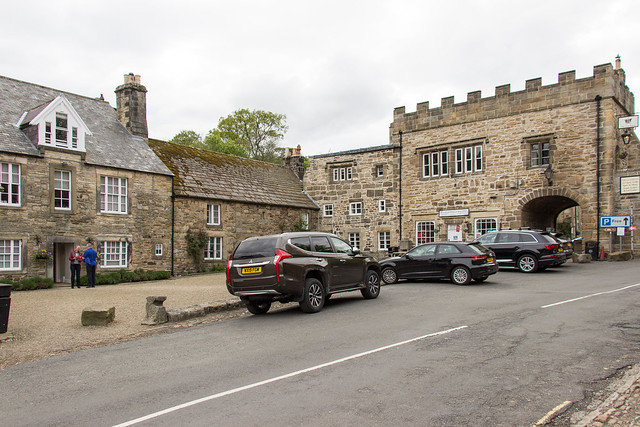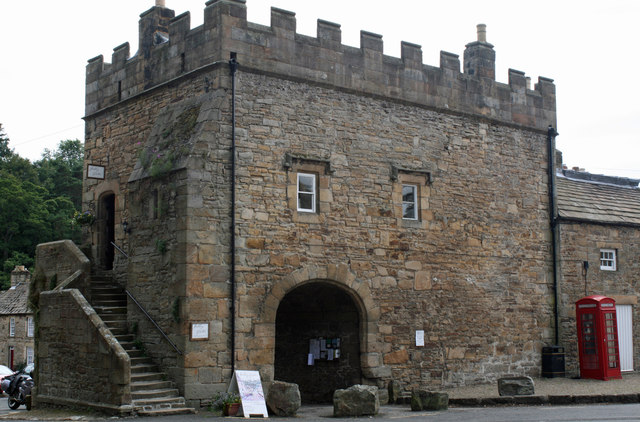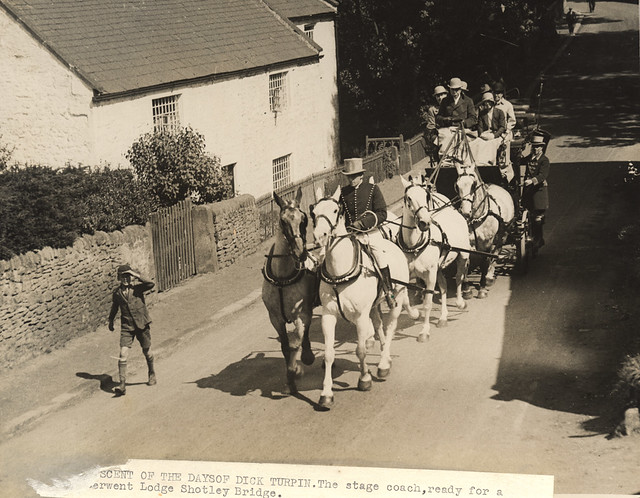Former Abbey Gatehouse, The Square, Blanchland, England

-
Description
The building to the right is a grade I listed historic gatehouse that was constructed in the 1400's. It was remodelled c. 1753. To the left of it is another grade I listed historic building that was built as a monastic outer court building in the 1200's with alterations in the 1500's and 1700's. The other buildings to the left have Medieval monastic origins but are only grade II listed with many subsequent alterations. "Blanchland is a village in Northumberland, England, on the County Durham boundary. The population of the Civil Parish at the 2011 census was 135. Set beside the river in a wooded section of the Derwent valley, Blanchland is an attractive small village in the North Pennines Area of Outstanding Natural Beauty. Blanchland was formed out of the medieval Blanchland Abbey property by Nathaniel Crew, 3rd Baron Crew, the Bishop of Durham, 1674–1722. It is a conservation village, largely built of stone from the remains of the 12th-century Abbey. It features picturesque houses, set against a backdrop of deep woods and open moors. Located near the Derwent Reservoir, it provides facilities for sailing and fishing. The Lord Crewe Arms Hotel has a vast fireplace where 'General' Tom Forster hid during the Jacobite rising of 1715. W. H. Auden stayed at the Lord Crewe Arms with fellow student Gabriel Carritt at Easter 1930, and later remarked that no place held sweeter memories. Writer Emily Elizabeth Shaw Beavan lived and wrote here when her husband worked at Derwent Mines. Blanchland may have been the model for the village in which was set the opening and closing scenes of Auden and Isherwood's play The Dog Beneath the Skin (1935). Another celebrated poet Philip Larkin used to dine at the hotel when staying with Monica Jones in Haydon Bridge. In July 1969, Benjamin Britten and Peter Pears stayed at the Inn. Scenes in the fictional town of Stoneybridge in the first three series of the CBBC programme Wolfblood were filmed in the village. Its unspoilt qualities make it a frequent setting for period films, set in the 18th century, such as those based on the novels of Catherine Cookson." - info from Wikipedia. Summer 2019 I did a solo cycling tour across Europe through 12 countries over the course of 3 months. I began my adventure in Edinburgh, Scotland and finished in Florence, Italy cycling 8,816 km. During my trip I took 47,000 photos. Now on https://www.instagram.com/billyd.wilson/" rel="noreferrer nofollow">Instagram. Become a patron to my photography on https://www.patreon.com/billywilson" rel="noreferrer nofollow">Patreon. -
Owner
Billy Wilson Photography -
Source
Flickr (Flickr) -
License
What does this mean? Attribution-NonCommercial License
-
Further information
Link: https://www.flickr.com/photos/32132568@N06/49971822192/
Resource type: Image
Added by: Simon Cotterill
Last modified: 5 years, 6 months ago
Viewed: 696 times
Picture Taken: 2019-05-19T13:37:35 -
Co-Curate tags



